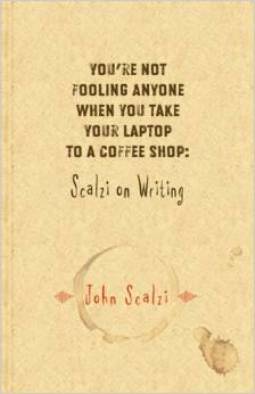Writerly New Year’s Resolutions and How to Make Them Work: Part 2

How are the New Year’s Resolutions working out?
Are you being a more productive writer?
If not, then you probably need to set things up so you can be more productive, which is what I promised to talk about this week.
It all comes down to time and space to write.
You can squeeze more into your existing writing time by having an effective writing process — we had that rant already in Part 1 — and by learning to touch type.
Touch typing rocks. The words appear on the screen by telepathy. No distractions, no fiddling fingers. You think better, write faster.
However, what you really want is more writing time, with less interruption, which in turn means establishing a better physical space within which to do it. The time and space then need defending.
The uncomfortable truth is that writing time is taken, not created.
Admit it! The writing time already exists, but you’re filling it with other activities.
Some activities you can easily declutter from your life — lunchtimes spent with acquaintances and colleagues just for the sake of socialising… video games you wouldn’t boast of on your tombstone… pointless Friday night carousing that leaves you too hung over to write on a Saturday…. addiction to social media.
Other activities are high-value — family time, friendships you enjoy, sports, gaming with friends… if you have to cut into these it’s better to be a good friend to a few people, and do a few sports well, than to spread yourself thin and do everything badly. (And by the way, going off to writers retreats doesn’t count. That’s like only being able to sing when drunk — not sustainable on a routine basis.)

As for physical space, the time you free up will often propel you into public places. I wrote my first novel at lunchtimes in a biker bar, and then revised it during my rail commute to Glasgow. The thing is to be low profile and move around between venues so as to not become one of the regulars everybody chats to… no matter how tempting this is. Avoid the coffee shop where your friends hang out.
If you write at home, it doesn’t have to be a proper study, or even particularly nice — Stephen King used to write in the laundry room of his trailer home. It just has to be a corner where you’re not in the way and not “at home” to visitors, which leads us to another uncomfortable topic…
Writing time is something you have to consciously defend from outside pressures.
Short term, this can mean anything from looking glazed and wearing headphones in a coffee shop, through to retreating to your computer cupboard and using growly Heavy Metal to keep out visiting older relatives while swearing inventively at children who pester you (top tip: don’t get the tactics muddled).
Long term, you can only really defend your writing time with buy-in from your friends and family.
The problem is that unless you have a contract or have had a sale, writing looks awfully like a self-indulgent hobby, neither more important nor productive than, say, gaming, and certainly something that it’s OK to interrupt if the dishes need doing or if something funny just happened that’s worth sharing or if it’s time to go to the pub.
Worse, trying to paint writing as any sort of career building sounds pretentious and then begs all sorts of follow up interactions — “I saw this interview with this self published author who got rich… Isn’t it finished yet?… You should write something literary….” A better strategy is to accept that it is a hobby but embrace your right to pursue it.
With friends, it may be best not to tell them you’re writing. There’s no need to be evasive though. Call your regular slot “social down time”, “me time” or even just “peace and quiet” which is what it is anyway for the next year or so; basically meditation, visualization and finger yoga.
With family and family-like roommates it’s more complicated because they can see what you are doing and they do have legitimate rights to your time and attention.
Again, don’t get all grandly authorial and angsty on them.
Treat the writing as your yoga and negotiate to create writing slots. This may involve trade offs, for example your partner may want hobby time too, and it will certainly mean that you need to discharge your responsibilities with prompt cheerfulness either side of your slot. If interrupted, try to keep your temper and calmly use the broken record technique: “Yes, I know you want X, but this is my writing time. I’ll be done at 8pm.”
This need to defend doesn’t stop when you start getting those contracts. There will always be tempting side projects, marketing activities such as blogging which can eat your time, professional associations that want your help, and cons to attend. You have to make decisions, take stands.
And if you end up writing full time, then you’ll have the problems that beset most self-employed homeworkers. There will be people who just can’t equate being at home with actually working. Be assertive, be rude. Do what it takes.
M Harold Page (www.mharoldpage.com) is a professional author with several franchise books on Amazon plus his creative writing handbook, Storyteller Tools explaining how he does it. If you live around Edinburgh, Scotland, he’d love to teach you Medieval German Longsword.